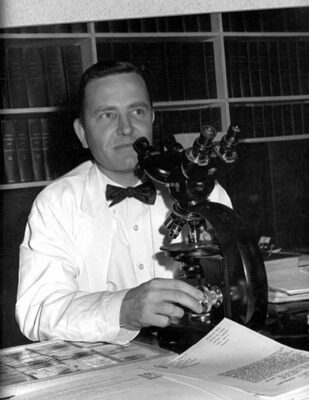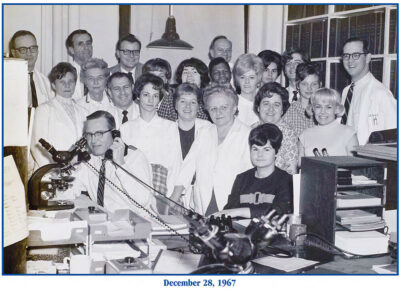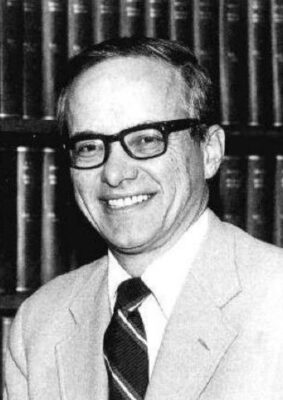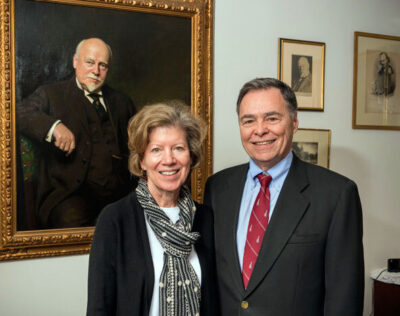
Shelley Lectureship
Dr. William Myles "Bill" Shelley (1928-1974)

Dr. William Shelley was born on April 25, 1928 in Atlanta, Georgia. He attended college at the Virginia Military Institute (VMI) graduating in 1949. After graduating with second highest stand in the pre-medical course, Dr. Shelley entered the Johns Hopkins University School of Medicine where he earned his Doctor of Medicine in 1953. He continued at Johns Hopkins for his residency training, completed a one-year fellowship at Memorial Sloan Kettering Cancer Center in New York with renowned Dr. Fred W. Stewart, and then returned to Johns Hopkins to become Chief Resident in 1959. He joined the faculty in 1960 as assistant professor and head of Surgical Pathology and was promoted to Associate Professor in 1964. Dr. Shelley participated in a six-month visiting professorship at the American University in Beirut in 1965.
In 1970, Dr. Shelley left Hopkins to accept a position as Director of Pathology at Charlotte Memorial Hospital in Charlotte, North Carolina. On September 11, 1974, returning on a professional trip from Charleston, South Carolina, he suffered injuries in an Eastern Air Lines crash at the Charlotte/Douglass International Airport. Dr. Shelley was flown to the Air Force Burn Center at San Antonio, Texas, where he died of his injuries on October 10, 1974. On Sunday, October 13, 1974, a memorial service was held at VMI's Memorial Garden where his ashes were strewn following the service, which concluded with a three-volley salute and the playing of Taps.
Charlotte Memorial Hospital, Charlotte, North Carolina (1970-1974)
Dr. Shelley was hired to transform the Department of Pathology into a dynamic center for academic productivity with its own residency training program. In step with his expansion and development of the Department, Shelley fostered interdepartmental good will and cooperative endeavors among the several academic centers in the Carolinas, and in particular devoted considerable time and effort to projects partnering with the Medical University of South Carolina. Today he remains a towering role model for pathologists, representing their critical role in interdisciplinary investigative research.
North Carolina Society of Pathologists
In reverence to Dr. Shelley, the Shelley Memorial Lecture was created in December 1974 with funds furnished by the Shelley Foundation and has been a frequent lecture given during the North Carolina Society of Pathologists annual meeting. Guest lecturers from Johns Hopkins have included Drs. Fred Askin in 1993 and Jonathan Epstein in 2014.
Legacy

The focus and breadth of Dr. Shelley's contributions to the published literature remind one of that golden era of medicine, when basic methods were sufficient to rapidly and measurably advance medical practice. Shelley coauthored works on the importance of grade and stage on management and outcome in bladder and prostate carcinomas, surgical management of hyperparathyroidism, pathologic-adrenergic functional correlations among paragangliomas and pheochromocytomas, the distribution of in-situ lobular breast carcinoma as a guide for surgical sampling, and clinical-pathologic features of giant cell arteritis.
William M. Shelley Memorial Lectureship at Johns Hopkins
Following the death of Dr. William M. Shelley, his many colleagues, friends and former students created a Visiting Professorship in his memory, formally established in 1977. In recognition of Dr. Shelley's commitment and contributions to teaching and residency training, the Director of Surgical Pathology invites an esteemed colleague to spend one day with the residents and faculty in addition to delivering this lecture.
| Year | Visiting Professorship |
|---|---|
| 2025 | Esther Oliva, M.D. The evolving morphologic and molecular landscape of endometrial stromal tumors |
| 2024 | Jason L. Hornick, M.D., Ph.D. Beyond Lineage: Diagnostic and predictive molecular immunohistochemistry |
| 2023 | D. Ashley Hill, M.D. DICER1 Syndrome: A Developing Story |
| 2022 | Edi Brogi, M.D., Ph.D. Papillary Neoplasms of the Breast notes on diagnostic challenges and management implications |
| 2021 | Rhonda Yantiss, M.D. The Pathogenesis of Coronavirus Disease-2019: Insights from Surgical Pathologists |
| 2020 | Cristina Antonescu, M.D. Recent Advances in the Molecular Classification of Mesenchymal Tumors |
| 2019 | Bruce M. Wenig, M.D. Viral-Associated Cancers of the Head and Neck |
| 2018 | William D. Travis, M.D. Clinical Impact of the Pathologic Diagnosis of Lung Cancer |
| 2017 | Teri A. Longacre, M.D. Lynch Syndrome in the Female Genital Tract: Where Are We Now and Where Are We Headed? |
| 2016 | Thomas M. Ulbright, M.D. Diversity Among Teratomas, with a Historical Perspective |
| 2015 | David S. Klimstra, M.D. Acina Neoplasms of the Pancreas: From Diagnostic Approach to Molecular Characterizartion and Therapeutic Targeting |
| 2014 | Arie Perry, M.D. Biomarkers in Neuro-Oncology |
| 2013 | Jean F. Simpson, M.D. Proliferative Breast Disease: Predictor or Precursor |
| 2012 | Stacey E. Mills, M.D. Viral and Molecular Insights in ENT Pathology |
| 2011 | Linda Ferrell, M.D. Non alcoholic Fatty Liver Disease |
| 2010 | Victor E. Reuter, M.D. Renal Neoplasia: Pathological, Clinical and Molecular Correlates |
| 2009 | David E. Elder, MBChB, FRCPA Melanoma Progression, Diagnosis and Prognosis |
| 2008 | Jeffrey L. Myers, M.D. The Pathologist's Role in Patients with Diffuse Lung Disease - Diagnosis or Pattern Recognition? |
| 2007 | K. Krishnan Unni, M.B., B.S. Osteosarcoma of Bone: 100 Years Experience at Mayo Clinic |
| 2006 | Sylvia L. Asa, M.D., Ph.D., FRCP(C), FCAP The Thyroid Nodule 2006: Diagnosis and Management Update |
| 2005 | Scott H. Saul, M.D. Learn to Love the Liver: A Systemic Approach to the Liver Biopsy |
| 2004 | Christopher D.M. Fletcher, M.D., FRCPath Evolving Concepts in Soft Tissue Neoplasia |
| 2003 | Robert H. Young, M.D. Treacherous Clefts |
| 2002 | Mark R. Wick, M.D. Prognostic and Predictive Factors in Surgical Pathology |
| 2001 | Stuart J. Schnitt, M.D. Benign Breast Disease and Cancer Risk: Morphology and Beyond |
| 2000 | Roger C. Haggitt, M.D. Neoplastic Progression in Ulcerative Colitis |
| 1999 | Alberto G. Ayala, M.D. Chondrosarcoma of Bone: The M.D. Anderson Experience |
| 1998 | Anna-Luise A. Katzenstein, M.D. The Interstitial Pneumonias |
| 1997 | Sharon W. Weiss, M.D. Liposarcoma - Current concepts |
| 1996 | Robert E. Fechner, M.D. Squamous Carcinoma Is Not an Easy Diagnosis |
| 1995 | Howard Dorman, M.D. Vascular Tumors in Bone: Emerging Controversies |
| 1994 | Virginia a. LiVolsi, M.D. Follicular Thyroid Carcinoma: An Entity Whose Time Has Passed? |
| 1993 | Margaret E. Billingham, M.D. Cardiac Transplantation - The Pathologist's Viewpoint |
| 1992 | Robert E. Scully, M.D. Early Ovarian Cancer |
| 1991 | David L. Page, M.D. Premalignant Breast Disease |
| 1990 | J. Bruce Beckwith, M.D. Precursor Lesions and Early Stages in Wilms' Tumor: Pathogenesis, Clinical and Biological Implications |
| 1989 | F. Stephen Vogel, M.D. The Medical-Legal Arena |
| 1988 | Louis P. Dehner, M.D. Small Cell and Yes, Large Cell Tumors of Childhood: How Far have We Really Come? |
| 1987 | Juan Rosai, M.D. Recent Advances in Thyroid Tumor Pathology |
| 1986 | Morgan Berthrong, M.D. Observations of Pathologic Changes After Therapeutic Radiation |
| 1985 | Robert W. McDivitt, M.D. The Utility of Kinetic Parameters in Predicting the Chance of Breast Cancer Relapse |
| 1984 | William M. Christopherson, M.D. Endometrial Carcinoma Prognosticators |
| 1983 | Basil C. Morson, M.D. The National History of Colorectal Cancer |
| 1982 | Costan W. Berard, M.D. Malignant Lymphomas as Tumors of the Immune System - A Pathologist's View |
| 1981 | Wallace H. Clark, Jr., M.D. Development and Evolution of the Primary Lesion of Cutaneous Melanoma |
| 1980 | Benjamin Castleman, M.D. The Massachusetts General Hospital. James Homer Wright and the Clinicopathological Conference |
| 1979 | Raffaele Lattes, M.D. Soft Tissue Tumors: Historical Perspective and Current Ideas |
| 1978 | Lauren V. Ackerman, M.D. Cancer in the Chinese in the Peoples' Republic is Different |
| 1977 | William H. Hartmann, M.D. In Situ Lobular Carcinoma: A Pathologist's Perspective |
Helpful Links
PubMed - Search: Shelly WM
Links for William M. Shelley
- Eastern Air Lines Flight 212
- Dr William Myles "Bill" Shelley Memorial
VMI - Virginia Military Institute
- His photo in the VMI yearbook of 1948
- His photo in the VMI yearbook - class of 1949-B
- Shelley as Class Officer - Historian 1949
- His class photo and comments with informal picture at bottom
- Shelley in Company D - Air Force division at BMI
Eggleston Lectureship
Dr. Joseph Eggleston (1936-1988)

Joseph C. Eggleston, M.D. was born in Memphis, Tennessee. He received his bachelor’s degree from Duke University in 1958 and his medical degree from Johns Hopkins in 1962, and completed his internship and residency at Hopkins. Dr. Eggleston also served as a captain in the United States Air Force Medical Center from 1963 to 1965. In 1969, he joined Johns Hopkins as a pathologist and assistant professor of pathology, and worked at Hopkins as professor and director of surgical pathology and as a pathologist for nearly 20 years until his death from lung cancer in January 1989 at the age of 52. As a surgical pathologist, Dr. Eggleston was instrumental in confirming and verifying critical diagnoses for thousands of patients and supporting the work of dozens of researchers at Hopkins.
Deeply committed to the field of pathology, Dr. Eggleston authored more than 150 scientific publications. He wrote the AFIP Fascicle on Lung Cancer Pathology a standard in the field for many years, and also co authored basic reference works on lung tumors. He developed and published a primary reference work on immunostaining methods which greatly enhanced pathologists’ ability to study and glean information from tumors and other disease processes.
Dr. Eggleston served as vice president of the American Registry of Pathology and was a member of the editorial board of the American Journal of Surgical Pathology. He also served on several national scientific advisory committees for the American Cancer Society and the National Cancer Institute , and was president elect of the Arthur Purdy Stout Society of Surgical Pathologists and councilor at large of the Maryland Society of Pathologists. He also was a member of Phi Beta Kappa, Alpha Omega Alpha, the International Academy of Pathology, the American Association of Pathologists, and the International Association for the Study of Lung Cancer.
Joseph C. Eggleston Memorial Lectureship at Johns Hopkins
| Year | Visiting Professorship |
|---|---|
| 2024 | Jerad M. Gardner, M.D. How You Tube, Facebook, and X (Twitter) changed my Life: The role of social media in pathology. |
| 2023 | Elizabeth A. Montgomery, M.D. Yes the biopsy needle was in the lesion – and other mishaps over the years |
| 2022 | Michael S. Torbenson, M.D. Fibrolamellar Carcinoma: Lessons from the Study of a Unique Type of Liver Cancer |
| 2021 | Gregory N. Fuller, M.D., Ph.D. CNS PRISM and Miliary Metastasis: Understudied Entities/Opportunities for Clinical Research |
| 2020 | Steven D. Billings, M.D. Vascular Tumors Then and Now |
| 2019 | Brian Rubin, M.D., Ph.D. From the Bench to the Bedside with Epithelioid Hemangioendothelioma: a Vascular Cancer Driven by TAZ(WWTR1)-CAMTA1 Gene Fusion |
| 2018 | Saul Suster, M.D. Problems and controversies in the classification of thymomas |
| 2017 | John R. Goldblum, M.D. |
| 2016 | Andrew E. Rosenberg, M.D. |
| 2015 | Louis, P. Dehner, M.D. |
| 2014 | Sharon W. Weiss, M.D. |
Sanfilippo Lectureship
Fred and Janet Sanfilippo

From 1993 to 2000, Fred and Janet Sanfilippo were the “first family” of the Department of Pathology. During that time, Dr. Sanfilippo was the Baxley Professor and Director of the Department of Pathology at Johns Hopkins, and Mrs. Sanfilippo served as the Assistant Provost and Director of City and Community Relations for the Johns Hopkins University. Together, they made a significant impact on the success of the Department of Pathology, Johns Hopkins Medicine, and the Johns Hopkins University.
As Director, Dr. Sanfilippo helped nurture the growth and development of the newly united Department of Pathology which brought together the departments of Pathology and Laboratory Medicine in the School of Medicine and the Johns Hopkins Health System. His emphasis was on alignment, culture, and innovation. That focus led to the creation of the current Pathology division structure, the Johns Hopkins Medical Labs, the graduate program in Pathobiology, and the Comprehensive Transplant Center, of which Dr. Sanfilippo was the Research Director. During his tenure, the Department of Pathology saw significant increases in sponsored research, fellowships, educational programs, clinical services and quality, departmental space and funding, and the recruitment of 75 new faculty, many of whom are still in the department today.
Sanfilippo Lectureship at Johns Hopkins
| Year | Visiting Professorship |
|---|---|
| 2025 | Claire Pomeroy, M.D., M.B.A. Medical Research Today: The Power, the Peril, and the Promise |
| 2024 | Chhavi Chauhan, Ph.D. Artificial intelligence in medicine: The best thing since sliced bread or are we toast? |
| 2023 | Anant Madabhushi, Ph.D., FAIMBE, FIEEE, FNAI Interpreter of Maladies: Computational Pathology for Precision Medicine |
| 2022 | Mark B. McClellan, M.D., Ph.D. Value-Based Payment for Pathology: Opportunities for the Future |
| 2021 | James L. Madara, M.D. AMA: Toward A Better Healthcare Future |
| 2019 | Jeffrey A. Golden, M.D. A Path from Computational Pathology to Precision Medicine |
| 2018 | Mark L. Tykocinski, M.D. Future of Medical Education: Osler-Flexner Redux |
| 2017 | Deborah E. Powell, M.D. |
| 2016 | Ronald S. Weinstein, M.D., FCAP |
| 2015 | Fred Sanfilippo, M.D., Ph.D. |
